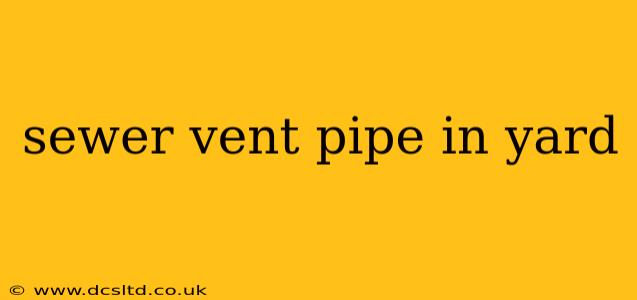Discovering a sewer vent pipe in your yard can raise questions and concerns. This comprehensive guide explains the purpose of these pipes, potential issues, and how to address them. We'll delve into frequently asked questions to provide a clear understanding of this often-overlooked element of your plumbing system.
What is a sewer vent pipe?
A sewer vent pipe, also known as a stack vent, is a crucial component of your home's plumbing system. Its primary function is to allow sewer gases to escape outdoors, preventing them from entering your home. These gases, a byproduct of waste decomposition, contain unpleasant odors and potentially harmful bacteria. Without proper venting, negative pressure can build up in the drain lines, hindering the efficient draining of sinks, toilets, and other plumbing fixtures. Imagine trying to drink from a straw with your finger covering the top; the vent pipe acts like the opening, allowing for proper drainage.
Why is my sewer vent pipe in my yard?
Sewer vent pipes are often located in yards for several reasons. Firstly, it's the most practical location for venting sewer gases away from living spaces. Secondly, routing the pipe through the yard often involves less disruption to the house's structure compared to running it through the walls or roof. Finally, placement in the yard allows for easier access for inspection and maintenance. The pipe itself is typically made of durable PVC, designed to withstand the elements.
What are the problems associated with sewer vent pipes?
While essential, sewer vent pipes can present issues if not properly maintained or installed.
Clogs and Blockages:
Leaves, debris, and small animals can sometimes obstruct the vent pipe, impacting the drainage system. A clogged vent leads to slow draining or complete drainage failure.
Leaks and Cracks:
Over time, the pipe can suffer from leaks or cracks, particularly if exposed to harsh weather conditions or soil movement. This can lead to unpleasant odors and potential ground contamination.
Improper Installation:
Incorrect installation can lead to several problems, including poor venting and inefficient drainage. This highlights the importance of professional installation.
Root Intrusion:
Tree roots are a common culprit in clogging or damaging sewer vent pipes. Their ability to penetrate pipes can significantly disrupt the system's functionality.
How can I tell if my sewer vent pipe is damaged?
Several signs indicate potential damage to your sewer vent pipe:
- Gurgling noises from drains: This often suggests a blockage in the vent system, preventing proper air exchange.
- Slow or clogged drains: Similar to gurgling noises, slow drainage points to a problem with the venting.
- Foul odors coming from drains: If you detect unpleasant smells emanating from your drains, a faulty or blocked vent is a strong possibility.
- Visible cracks or damage: A physical inspection of the pipe, especially after periods of heavy rain or freeze-thaw cycles, can reveal visible signs of damage.
How do I fix a damaged sewer vent pipe?
Fixing a damaged sewer vent pipe is often best left to experienced plumbers. They have the necessary tools and expertise to diagnose the problem accurately and perform the repair effectively. Minor clogs might be cleared using specialized plumbing tools, but significant damage requires professional intervention.
What are the costs associated with sewer vent pipe repair or replacement?
The cost of sewer vent pipe repair or replacement varies based on several factors, including the extent of damage, the pipe's location, and local labor costs. It is recommended to obtain quotes from multiple qualified plumbers to compare pricing and services before proceeding with any repairs.
How often should I check my sewer vent pipe?
Regular inspection is recommended, especially after periods of extreme weather. A yearly visual inspection can help identify potential issues before they escalate into costly repairs.
This article provides a general overview; always consult a qualified plumber for specific issues or concerns regarding your sewer vent pipe. Proper maintenance is key to avoiding costly repairs and ensuring the smooth operation of your plumbing system.
